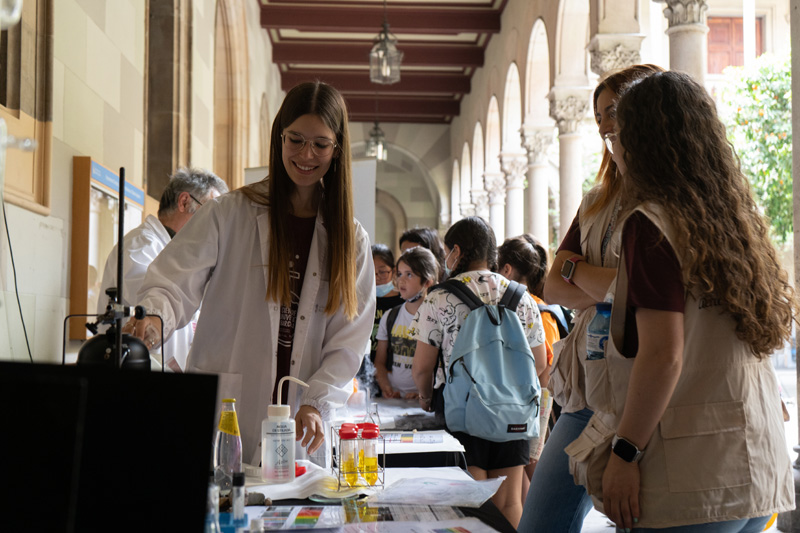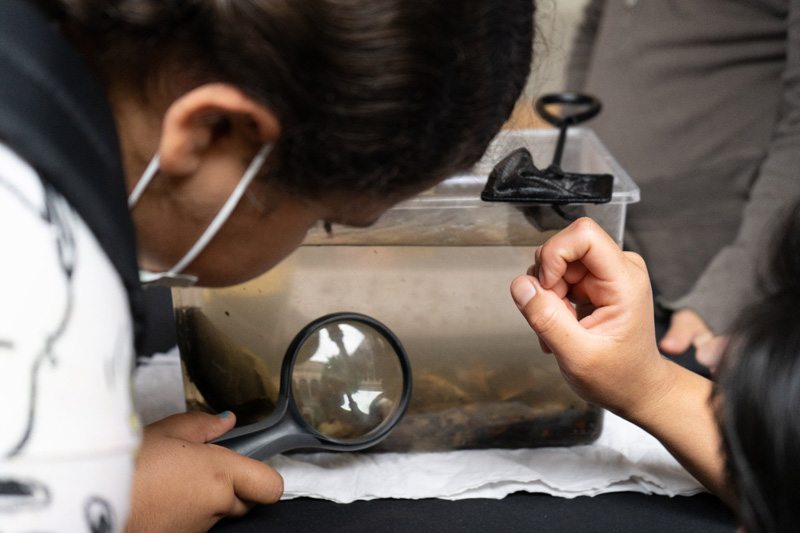Science Festival 2023
This ninth edition has concluded with the holding of 65 workshops, the involvement of 390 researchers from the University, and the participation of 20 volunteers from the PAS collective and students. In addition, there has been the work of 4 technical units, the center administrations of different faculties and the units and services necessary for the good organization and development of the activity.
Approximately 1798 people attended. Friday's event had the participation of 898 people, where 341 were primary school students, 378 ESO students, 114 high school students and 65 teachers. There is no precise data for Saturday's event, since entry was free without formalizing prior registration. However, it has been extrapolated that attendance was 900 people.

IRBio activities:
As every year, IRBio has also participated in the Science FESTIVAL through the activities of its research groups:
|
Insectes a prop de casa: descobrim el fabulós món de les efímeres |
Almudi Lab. Departament de Genètica, Microbiologia i Estadística. Facultat de Biologia |
|
Oikopleura dioica, els nostres germans del plàncton marí |
EvoDevoGenomics (Cañestro’s Lab). Departament de Genètica, Microbiologia i Estadística. Facultat de Biologia |
|
Seguiment de la biodiversitat marina en espais protegits |
Biologia de la Conservació en Ecosistemes Marins. Institut de Recerca de la Biodiversitat. Departament de Biologia Evolutiva, Ecologia i Ciències Ambientals. Facultat de Biologia |
|
L’ecoepidemiologia, clau per a la salut del futur |
EvoDevo-CAT. Departament de Biologia Evolutiva, Ecologia i Ciències Ambientals. Facultat de Biologia |
|
Qui viu sota les pedres del riu? |
Projecte RiuNet. Freshwater Ecology, Hydrology and Management (FEHM-Lab). Departament de Biologia Evolutiva, Ecologia i Ciències Ambientals. Facultat de Biologia |
- L’ecoepidemiologia: clau per a la salut del futur: De la bota a la bata
-> Research group: Jordi Serra Cobo and Evo-devo Cat
- Seguiment de la biodiversitat marina en espais protegits:
Marine protected areas are an essential management tool for the preservation of coastal ecosystems. In this workshop we will present the scientific monitoring program of marine spaces carried out by the University of Barcelona, promoted by the Department of Territory and Sustainability. This study aims to monitor marine biodiversity in all the protected marine areas of Catalonia. Until now, monitoring had been concentrated especially in the Cabo de Creus Natural Park and the Montgrí Natural Park, the Medes Islands and the Baix Ter, but currently it extends to all areas included in the Natura 2000 network, of which that there is still no scientific data as detailed as in the case of marine parks. In the workshop we will see the main species and habitats that are studied in this monitoring and the sampling techniques through scientific diving. The objective of this task is to provide rigorous scientific information to improve the state of conservation of the biodiversity of the marine environment of the entire territory and protect it.
-> Research group: Biologia de la Conservació en Ecosistemes Marins- Oikopleura dioica, els nostres germans del plàncton marí
Marine plankton is the set of organisms, generally microscopic, that live suspended in seawater and on which larger animals such as fish or even whales feed. Now... what can humans have in common with any of these tiny organisms? Well more than we think. Oikopleura dioica is one of the members of marine plankton and it turns out that it belongs to the evolutionary sister group of our own group: the vertebrates (fish, amphibians, reptiles, mammals and birds). In its body we can find many of the organs and structures that also exist in our body and in that of all other vertebrates. Furthermore, Oikopleura dioica evolves much faster and is much simpler than we do, so by studying its biology and evolution we can learn many things from our origins. In this workshop we will learn about Oikopleura dioica, we will know how these distant brothers live and we will see how we can distinguish within their microscopic body the same organs and structures as in ours.
-> Research group: EvoDevoGenomics
- Qui viu sota les pedres del riu?
Rivers are water currents that originate in the mountains and flow into the sea or another river. Many times, rivers can become dirty and polluted due to our use or factory activity, which represents a danger to living animals and plants, and also to people. In this workshop we will learn about the RiuNet application, which is used to detect the health status of a river using bioindicator organisms (in this case, with the invertebrate fauna that lives in the water). Furthermore, this is a citizen science project, that is, the data generated by anyone with the application is shared with researchers and, thus, contributes to their research. In the workshop we will simulate a river ecosystem with live animals and we will learn how to use the application to identify them and understand their bioindicator role, to finally evaluate the ecological quality of the system.
-> Research group: FEHM
Insectes a prop de casa: descobrim el fabulós món de les efímeres
In this workshop we will approach the fantastic world of insects, and we will present one of the most unknown groups in Catalan territory: the mayflies. We will observe the different stages of the life cycle of the mayflies (nymphs and adults) of the species Cloeon dipterum and we will learn to differentiate males and females. We will also see what one of the most curious visual systems in the animal world is like, since males have one more pair of eyes than females.
See you next year for another edition!
